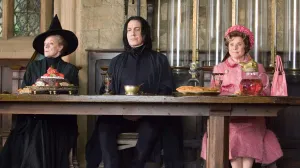Star Wars: The Rise of Skywalker and Star Wars: The Last Jedi are now, officially, the most divisive installments of the entire nine-part Skywalker Saga – in large part because of the way the two films seem to disagree with one another. There’s been no shortage of controversy over the way that J.J. Abrams and Lucasfilm seem to be using The Rise of Skywalker to throw Rian Johnson and The Last Jedi under the proverbial bus. However, ironically enough,the major shift between Last Jedi‘s rebuke of the past and Rise of Skywalker‘s nostalgia play (specifically the return of Emperor Palpatine / Darth Sidious) actually validates one of the major points that Johnson made in The Last Jedi!
Videos by ComicBook.com
Here’s why Star Wars: The Rise of Skywalker Proves Rian Johnson Understands the Skywalker Saga better than anyone. Warning: MAJOR SPOILERS for The Rise of Skywalker follow!
About halfway into Star Wars: The Last Jedi we find Rey (Daisy Ridley) on Ahch-To, having convinced Jedi Master Luke Skywalker to train her (at least, sort of…). Luke commits to teaching Rey three crucial lessons – the second of which has to do with the history of the Jedi, and the proper perspective on that history. According to the Luke:
“Lesson two. Now that they’re extinct, the Jedi are romanticized, deified. But if you strip away the myth and look at their deeds, the legacy of the Jedi is failure. Hypocrisy, hubris. At the height of their powers, they allowed Darth Sidious to rise, create the Empire, and wipe them out. It was a Jedi Master who responsible for the training and creation of Darth Vader.”
Rey tries to point out that Luke is missing the perspective that he, also a Jedi Master, redeemed Darth Vader and created balance again. Luke concedes that’s true, but then reminds her it was him who in turn then created the threat of Kylo Rey.
This scene in The Last Jedi has become one of the most controversial in modern Star Wars lore. To say that there have been strong reactions to it would be an understatement. For a lot of fans, Luke’s view of the Jedi as failures was an unforgivable twist of the knife Johnson – but as stated, The Rise of Skywalker has now come along and validated Luke’s point, entirely.
We now know from the Star Wars Sequel Trilogy and its various tie-ins (books, comics, etc.) that Palpatine created Snoke as a body vessel to control, and it was Snoke who lured Ben Solo over to the dark side, and inspired the paranoia in Luke that helped push Ben over the edge. In short: Ben Solo becoming Kylo Ren, and Luke’s hand in it, were all part of Palpatine’s scheme – which means that once again, at a time when the Jedi were supposed to be in a position of power and control, that pride and/or confidence was actually massive hubris that allowed Darth Sidious to amass power once again. So not only was Rian Johnson not wrong in having Luke come to that cynical (but realistic) point of view, thanks to Rise of Skywalker’s Palpatine storyline, Luke Skywalker’s story is now truly one of hubris and failure.
If Luke Skywalker became a legend for defeating Palpatine by redeeming Vader, then the Sequel Trilogy story only proves that “legend” title was misapplied to Luke, as Palpatine was never fully defeated in Luke’s lifetime, and his redemption of Vader is offset by his role in the corruption of Ben Solo. It only makes it that more understandable, then, that Luke’s ultimate decision is to take himself off of destiny’s wheel, by living in seclusion on Ahch-To. It also makes much more sense after Rise of Skywalker why Luke refuses to ever pick up the lightsaber and fight the First Order: Luke’s biggest victories in the saga (after destroying the Death Star) were both earned by knowing when not to fight. His refusal to strike down Vader was the key reason the Empire was defeated; Luke’s refusal to actually duel Kylo Ren gave Leia, Rey, and The Resistance the time needed to survive and strengthen for the final battle. And, arguably, the mercy he showed “Kylo Ren” by not fighting was arguably the first step in the redemption of Ben Solo.
What Rian Johnson ultimately understood better than most, is that Star Wars‘ Skywalker Saga was never about pure heroism triumphing over evil. In the cases of Anakin, Luke, Leia, and Ben, the theme is pretty clear that heroism can be a hubris that begets failure, but in that failure, redemption and greater wisdom / connection to the Force is found. Anakin became a Clone Wars hero, only to become Vader, only to redeem himself and defeat Plapatine; Luke redeemed Vader, only to push Ben into the dark side, only to redeem himself by inspiring Rey’s rise. Ben was prodigy who fell to the dark side and murdered his father, only to redeem himself by helping Rey defeat Palpatine, and literally giving his life to save hers. Even Leia became a Rebellion hero, only to lose her son to the dark side, only to save Rey by helping Ben redeem himself. This is the story of the Skywalkers – as Rian Johnson tried to explain, in no uncertain terms.
Star Wars: The Rise of Skywalker is now in theaters. The Last Jedi is now on streaming on Disney+.








